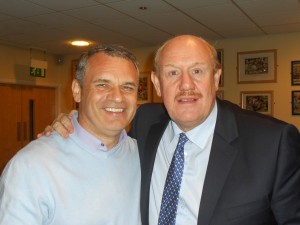The Rugby Football League is confident its plan for a split into three divisions during the season will get the go-ahead after making significant changes.
Super League clubs have agreed in principle to reduce the number of teams from 14 and re-instate automatic promotion and relegation from 2015, but have yet to decide which of three options to back.
There has been little support so far for plans for two divisions of 10 clubs and the Super League players association, 1eagu3, last week published the findings of a poll in which their members voted overwhelmingly for two divisions of 12.
The players largely dismissed the complex third option of splitting two divisions of 12 into three of eight a third of the way through the season but amendments to that plan were received more favourably by the Super League clubs at a presentation in Salford last week.
Under the revised plan, clubs would play 23 matches from home-and-away fixtures and the Magic Weekend before the split and then play just seven more games in a three-division format to determine the make-up of the two divisions for the following season.
The Championship clubs have also been updated on the changes and the matter will be discussed more fully at the annual meeting of the RFL Council on July 3, with a view to putting it to a vote at an extraordinary general meeting in August or September.
Picture shows Phil Cooper who delivers State of Mind education sessions with former players with Brian Barwick at the recent Exiles game 
Some of the issues yet to be resolved are central funding, the play-off format and the impact on the Challenge Cup, with the top eight clubs likely to receive byes into the fifth round.
RFL chief executive Nigel Wood says he is delighted with the positive dialogue that is taking place as part of the league’s policy review.
“I am encouraged and excited by the way in which the clubs are taking this opportunity to engage in positive and proper debate as we look to restructure the professional game from the 2015 season,” Wood said.
“The Super League clubs engaged in a full and open debate at Monday’s meeting when there was an acceptance that change of some kind needs to occur.
“There was also a widespread recognition that sustaining 14 clubs is proving challenging in the current economic climate.
“The RFL’s policy review is intended is to provide an independent evaluation of the various alternatives that are available to the professional game so that the competitive structure from 2015 is as commercially compelling as possible.
“For that to happen, there needs to be some degree of jeopardy and an acknowledgement that on-field performance is the key determinant of which league a team plays in.
“I am confident the sport as a whole, through proper debate, will deliver a very exciting future for rugby league.
“I now expect the debate to continue to develop further at the forthcoming RL Council meeting, where it will involve all sections of the game.”

